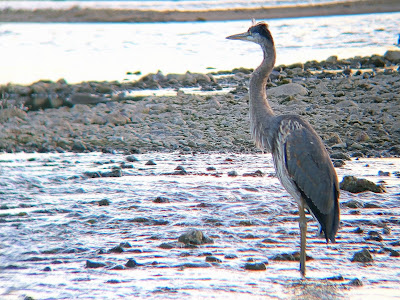Basic Gear
Air, distance, sun and shade can easily deceive a hunter; milk pods appear as turkey heads, bent lily pads look like ducks, shelf mushrooms look like other hunters, blinds seem occupied, dumped appliances give the impression of a parking area.
Singling out lawful game can be difficult. For example, accidentally firing upon a flock of geese mixed with cormorants could wind up illegal even though these unrelated birds mix together and appear identical at times. In other areas, hunters may only bag a turkey with a visible tuft of hair called a beard. Many game animals are now regulated with anatomical restrictions that a hunter must be able to spot.
Monocular
A monocular is a telescope made with prisms to reduce its overall length. A monocular is even smaller than a field scope. A monocular is used for single eye viewing of distant objects and scenery. For sporting, a monocular ought to ruggedized and not a delicate instrument or an eccentric contraption.
Hunting with Galileo
The term monocular (for distant objects) could not be found during a search of 19th century publications; instead, the terms “hunting telescope” and “Spyglass” were used:
“…an opera-glass that was described to him as a hunting telescope…” -1818 A second journey through Persia
“Jarrocks pulled out his hunting-telescope, and having marked the bird down with the precision of a billiard-table keeper…” -1831 The New Sporting Magazine
At the start of the 20th century, the term hunting telescope meant a telescope attached to a firearm:
“…the Stevens hunting telescope fits not only its own rifles, but its mounts are designed especially for the Savage and Marlin rifles.” -1912 Field and Stream
While hunting-telescopes were being fitted with pin sights and cross hairs, and the term hunting-telescope was being surrendered to the arms companies (J. Stevens Arms and Tool Company/others), adventurers began to write of monocular use. Following in the footsteps of Sir Samuel Baker, Harry Storey wrote an appendix on monocular use:
“A glass…might come in handy at times. I usually carry a 6-power Güerz prismatic monocular – small, portable and powerful enough. -1907 Hunting And Shooting In Ceylon
Reputation
The qualities of a sport monocular are unique and unrelated to the displeasures of rangefinders or night vision devices. Compared to field glasses, a monocular sometimes has a smaller field of view, but sometimes a monocular offers a larger field of view. Beyond this, the disadvantages of using a monocular are mostly gossip. The ten to fourteen basic visual cues for depth and distance are all monocular. Furthermore, occluding one eye is actually therapeutic at times. Lastly, eye strain is mostly related to electric displays, eye focus and conditions using both eyes.
Motion Sickness
Motion Sickness does not require movement and can be visually induced. Visually Induced Motion Sickness is normal. The treatment (prevention and therapy) for Motion Sickness is habituation. For field glasses or a monocular, habituation implies exclusive ownership, a breaking-in period and regular viewing practice, avoiding long intervals of nonuse.
Advantages
Monoculars have a simplified design and a practical purpose. A monocular is worthwhile for most people and highly recommended for people with very unequal eye conditions because wide-ranging disparities in eye traits can exceed the accommodations of field glasses.

Stealth Gear | Run and Gun
A monocular is sometimes described as less than half the body of binoculars. Monoculars are less likely to interfere with concealment. Monoculars are easier to hold with one hand allowing a hunter to steady his posture, call game or transition to a weapon. A monocular is well suited for close quarter tactics like hunting dense brush or stands of trees. Scouting, tracking, stalking, still hunting, jump shooting, and walks for birds (especially turkey, wood duck, and teal) are all examples of hunting styles that benefit from compact, ultra light optics.
Alpen® Sport Monocular
Online price survey $45.95-$79.74 / MSRP: $92.00
Model/Code/Item: 120
8x25 Magnification Diameter | Objective Lens
4mm exit pupil
Adjustable Focus | 3.5m Close Focus
6.1˚ Field | 321ft. Field of View @ 1000 yrds.
18mm Long Eye Relief | Adjustable Eye Cup
Fully Multi-Coated BAK4 Optics
Waterproof | Fogproof
5 oz.
The Alpen Sport Monocular is made with dull, ecological colors that do not impair camouflage or concealment.
Much of the Alpen Sport Monocular appears to be a precision milled, hard metal alloy, including the wide-ranging knurled focuser.
The Alpen Sport Monocular’s rubberized armor, shielding and hood are also a non-slip palm and finger grip.
Turning, adjustable Eye Cup has 3 stop positions.
A stud and rotating swivel loop comes with a wrist strap, but afterwards might hold a neck strap, lanyard, tether, carabiner, snap clip, or paracord.
No Fault, No Problem, Lifetime Warranty.

Author’s Analysis
Easily manageable, heavy-duty, first-class optical qualities and an instinctive design are the overall impressions of the Alpen Sport Monocular. The Alpen monocular had better brightness, resolution and field of view than some higher magnification binoculars. The Alpen Sport Monocular oversteps outdated limitations and advice almost certainly because of its Fully Multi-Coated Optics.
Alpen® Optics
California’s Alpen Optics is an “affordable alternative”, a true to life purveyor of binoculars, monoculars, spotting scopes, rifle scopes and accessories. Alpen works hard to include premium features, winning seven years worth of "Great Buy Awards" from Outdoor Life, a "High Score" from Bird Watcher’s Digest and a "Best of the Test" from Field and Stream. Alpen’s mission is to have the best customer service and “provide superior quality optical products at affordable prices”.
About
I requested the opportunity to feature the Alpen® Sport Monocular for the 2013 Monocular Special. I utilized a donated sample for this purpose. Currently, I am not otherwise affiliated or associated with Alpen® Optics and have not received pecuniary compensation or incentive from Alpen® Optics.
















































